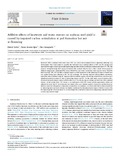Mostrar el registro sencillo del ítem
Additive effects of heatwave and water stresses on soybean seed yield is caused by impaired carbon assimilation at pod formation but not at flowering
| dc.creator | Soba Hidalgo, David | es_ES |
| dc.creator | Arrese-Igor Sánchez, César | es_ES |
| dc.creator | Aranjuelo Michelena, Iker | es_ES |
| dc.date.accessioned | 2023-01-09T12:39:07Z | |
| dc.date.available | 2023-01-09T12:39:07Z | |
| dc.date.issued | 2022 | |
| dc.identifier.citation | Soba, D., Arrese-Igor, C., & Aranjuelo, I. (2022). Additive effects of heatwave and water stresses on soybean seed yield is caused by impaired carbon assimilation at pod formation but not at flowering. Plant Science, 321, 111320. https://doi.org/10.1016/j.plantsci.2022.111320 | en |
| dc.identifier.issn | 0168-9452 | |
| dc.identifier.uri | https://hdl.handle.net/2454/44570 | |
| dc.description.abstract | Heatwave (HW) combined with water stress (WS) are critical environmental factors negatively affecting crop development. This study aimed to quantify the individual and combined effects of HW and WS during early reproductive stages on leaf and nodule functioning and their relation with final soybean seed yield (SY). For this purpose, during flowering (R2) and pod formation (R4) soybean (Glycine max L. Merr.) plants were exposed to different temperature (ambient[25ºC] versus HW[40ºC]) and water availability (full capacity versus WS[20% field capacity]). HW, WS and their combined impact on yield depended on the phenological stage at which stress was applied being more affected at R4. For gas exchange, WS severely impaired photosynthetic machinery, especially when combined with HS. Impaired photoassimilate supply at flowering caused flower abortion and a significant reduction in final SY due to interacting stresses and WS. On the other hand, at pod formation (R4), decreased leaf performance caused additive effect on SY by decreasing pod setting and seed size with combined stresses. At the nodule level, WS (alone or in combination with HW) caused nodule impairment, which was reflected by lower leaf N. Such response was linked with a poor malate supply to bacteroids and feed-back inhibition caused by nitrogenous compounds accumulation. In summary, our study noted that soybean sensitivity to interacting heat and water stresses was highly conditioned by the phenological stage at which it occurs with, R4 stage being the critical moment. To our knowledge this is the first soybean work integrating combined stresses at early reproductive stages. | en |
| dc.description.sponsorship | D.S. was a recipient of a PhD fellowship from the Public University of Navarra. | en |
| dc.format.mimetype | application/pdf | en |
| dc.language.iso | eng | en |
| dc.publisher | Elsevier | en |
| dc.relation.ispartof | Plant Science 2022 321 (111320) | en |
| dc.rights | © 2022 The Authors. This is an open access article under the CC BY-NC-ND license | en |
| dc.rights.uri | http://creativecommons.org/licenses/by- nc-nd/4.0/ | |
| dc.subject | C and N metabolism | en |
| dc.subject | Heatwave | en |
| dc.subject | Interacting stresses | en |
| dc.subject | Nodule | en |
| dc.subject | Soybean | en |
| dc.subject | Water stress | en |
| dc.title | Additive effects of heatwave and water stresses on soybean seed yield is caused by impaired carbon assimilation at pod formation but not at flowering | en |
| dc.type | Artículo / Artikulua | es |
| dc.type | info:eu-repo/semantics/article | en |
| dc.date.updated | 2023-01-09T12:18:35Z | |
| dc.contributor.department | Institute for Multidisciplinary Research in Applied Biology - IMAB | en |
| dc.contributor.department | IdAB. Instituto de Agrobiotecnología / Agrobioteknologiako Institutua | es_ES |
| dc.rights.accessRights | Acceso abierto / Sarbide irekia | es |
| dc.rights.accessRights | info:eu-repo/semantics/openAccess | en |
| dc.identifier.doi | 10.1016/j.plantsci.2022.111320 | |
| dc.relation.publisherversion | https://doi.org/10.1016/j.plantsci.2022.111320 | |
| dc.type.version | Versión publicada / Argitaratu den bertsioa | es |
| dc.type.version | info:eu-repo/semantics/publishedVersion | en |
| dc.contributor.funder | Universidad Pública de Navarra / Nafarroako Unibertsitate Publikoa | es |



